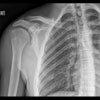
LONDON (Reuters), May 30 - Fewer but more concentrated doses of radiotherapy could be as safe and effective as a longer-course treatment for breast cancer patients, researchers said on Tuesday.
Women having radiotherapy, which is given to reduce the risk of the cancer returning after surgery, normally receive 25 doses over five weeks.
But a 10-year trial of a shorter course of 13 larger doses showed it worked just as well as the standard treatment and without an increase in side effects.
"We think it should be possible to give fewer but higher daily doses of radiotherapy to the breast to prevent cancer from returning, without harming the patient's healthy tissues," said Professor John Yarnold of the Institute of Cancer Research and the Royal Marsden NHS Foundation Trust.
Yarnold and his team, who reported their findings in the journal Lancet Oncology, compared the shorter dose of radiotherapy with the standard treatment on 1,410 women who had radiotherapy following surgery.
After monitoring their health for 10 years, they found the shorter course was as good as the extended treatment.
The researchers added the results of other trials are needed to confirm that concentrated therapy is as effective in the long term. The shorter treatment would be more convenient and simpler for patients and may also cut healthcare costs for administering the treatment.
If confirmed, "in the larger follow-up studies, it could mean better outcomes with less hospital visits for patients and therefore an improvement in their quality of life," said Dr. Lesley Walker of the charity Cancer Research UK.
Breast cancer is one of the most common cancers in women. More than a million cases occur worldwide each year, according to the International Agency for Research on Cancer (IARC) in Lyon, France.
Most cases develop in women over 50 years old but a small percentage occurs in younger women.
Breast cancer is treated with surgery and radiotherapy, which kills cancer cells left in the breast after the tumour has been removed, chemotherapy and hormone treatment, or a combination of them, depending on the cancer and stage of the illness.
Factors which can increase a woman's risk of the breast cancer include having a mother or close relative with the disease, inherited mutations in the BRCA1 or BRCA2 genes, an early puberty, late menopause and not having any children.
Last Updated: 2006-05-30 9:54:30 -0400 (Reuters Health)
Related Reading
Radiotherapy can benefit elderly women with early breast cancers, May 17, 2006
Copyright © 2006 Reuters Limited. All rights reserved. Republication or redistribution of Reuters content, including by framing or similar means, is expressly prohibited without the prior written consent of Reuters. Reuters shall not be liable for any errors or delays in the content, or for any actions taken in reliance thereon. Reuters and the Reuters sphere logo are registered trademarks and trademarks of the Reuters group of companies around the world.
















